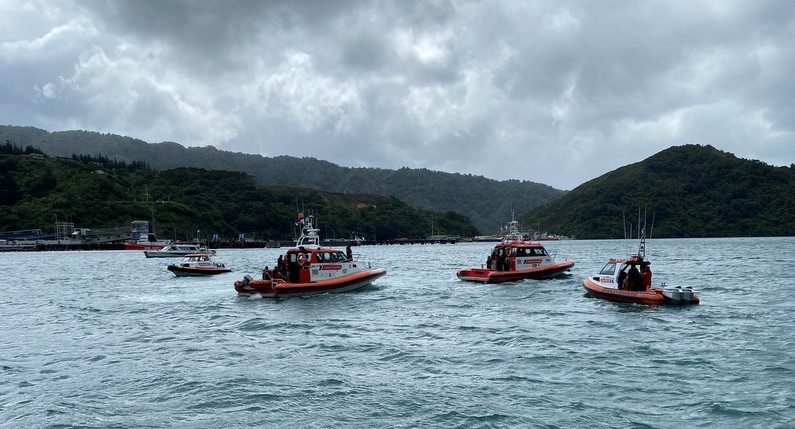
Making sense out of chaos
How Coastguard Tautiaki Moana prepares for the worst case scenario whilst getting most value out of volunteer time.
Over the last few years, Coastguard-led regional training exercises have had a shift in design and execution. Jonny Bannister, Regional Manager North for Coastguard has been working on the new model. “Volunteer time is precious! When people give up their time, we want them to feel like it was really worthwhile and they can confidently manage complexity.”
“We assessed that training incident management teams (IMT) simultaneously with on-water crews meant compromises for both groups,” says Jonny. “There’s always a delay between the information coming to the incident managers and responders receiving taskings. Eliminating that delay by using an ‘Exercise Control’ not an IMT means we can target the skills we want our people to perfect whilst maximising their time on the water.”
For a junior crew member on a rescue vessel, it might be the first time they have ever formulated and executed a multi-vessel search. “Exercise Control provides clear and precise tasking information, which removes any anxiety or confusion. This allows crews to hone their skills and confidently get the search underway. Through clever scenario design we then introduce complexity into the tasking, so they know what ‘good’ looks like.”
Repetition and progression are core strategies. For a given exercise spanning an evening and the following day, the same general scenario is completed three times. Firstly, as a simple operation, secondly with setbacks and problems, thirdly as a highly chaotic situation. For example, firstly a set of Coastguard Rescue Vessels conducting search patterns for a missing boat. Secondly when one of the rescue vessels breaks down and needs a tow. Thirdly, where the missing boat is reported on fire and requires the immediate rescue and triage of severely injured occupants.
“Being able to complete the full operation three times, gives immediate opportunity to implement lessons identified,” says Jonny. This gives crews the satisfaction of completing the task more effectively each time. “We create an environment where it’s ok to make mistakes, because you’ll get another go in a few hours. We go to lengths to encourage our vessel Masters to set a culture that is non-competitive and supportive of errors and learning.”
Each iteration follows the full scope of an operation, from activation, mobilisation and tasking through to the final transfer of rescued persons to higher medical aid. To get three full runs, the scenarios are generally narrower in scope. “We found we don’t need to make it overly complex to be effective, especially for newer volunteers,” says Jonny.
The chaotic phase is another key aspect. “Response plans are helpful in many situations, but we need to be able to adapt to what we see on the day. Giving our people exposure to chaos and complexity, then helping them learn to turn it into order, will pay dividends in larger scale multi-agency incidents in the future.”
This formula certainly seems to be a hit with the volunteers.Feedback has been overwhelmingly positive from the 20 regional exercises over the last two years across the country.
“Best weekend I have had at Coastguard.”
“Well put together and organised.”
“Volunteers loved the night-time event, great also to have Police alongside to support our work.”
Jonny looks forward to taking this concept to the next level. “Volunteers are coming away feeling like they have been challenged, learned heaps and had the opportunity to succeed. That’ll ensure they remain motivated and rescue ready when serving our communities on the water. The next step will be to test the format at the multi-agency level.”
Feature Image: Coastguard Rescue Vessels from units in Nelson, South Taranaki, Kaikoura, and Marlborough heading out to begin a multi-vessel search during the Marlborough Sounds Regional training exercise. Supplied Coastguard Tautiaki Moana
Enjoy this story?
Sign up to our Link Newsletter to receive stories like this plus NZSAR news and announcements direct to your inbox, every six weeks.
Follow NZSAR on LinkedIn for more SAR news, announcements and discussion.
This story was originally published in the April 2025 issue of Link magazine, which is produced by the NZSAR Secretariat for the wider search and rescue sector.
